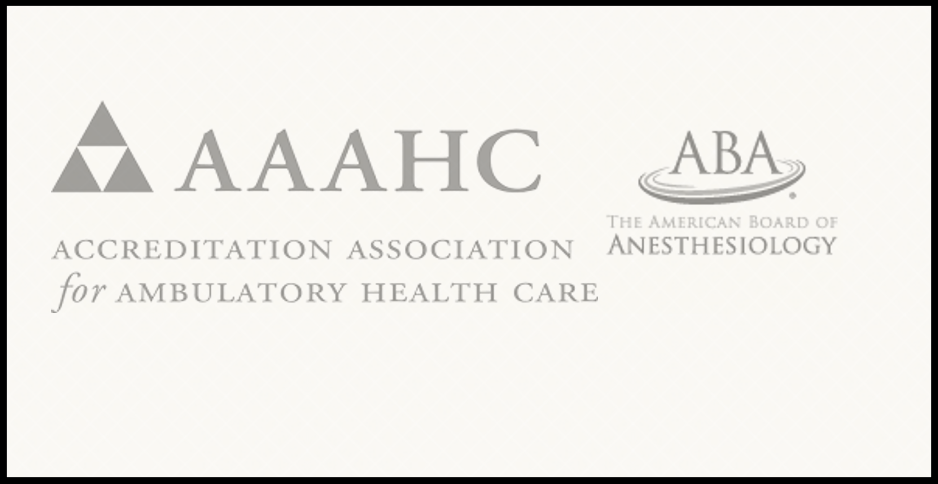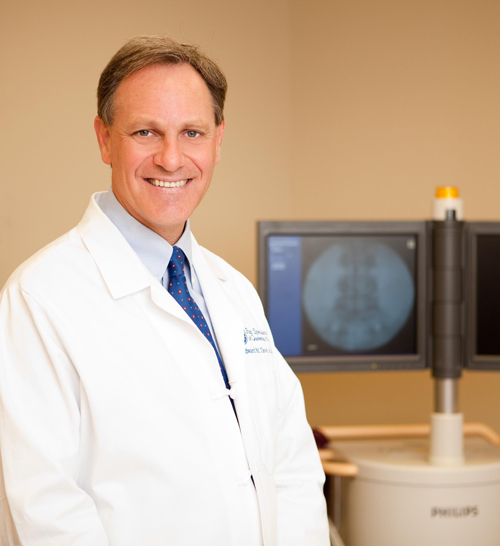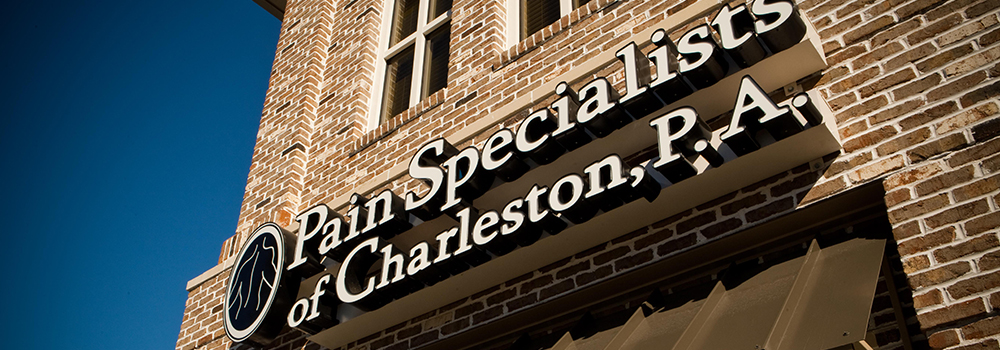Back Pain

BACK PAIN PHYSICIAN IN CHARLESTON, SC
Chronic back pain is one of the most common complaints physicians hear and it’s a leading cause of disability. If you suffer from back pain, you’re not alone.
Fortunately, there are several non-surgical treatments and techniques to ease–and prevent–constant back pain. In fact, surgery is rarely used to treat back pain.
The good news is with a certified back pain specialist, you can source the root cause and get proper relief. At Pain Specialists of Charleston, we offer double board certified physicians to assist you in your pain management journey to get you real results, no referral needed! So, if you’re in the Low Country area come see us open 5 days a week, we’re even accepting same day appointments!
No Referral Needed — Same Day Appointments — Accepting New Patients
Request Appointment | Meet Pain Doctors | Contact Us | Visit Us
SIGNS & SYMPTOMS
Most people know when they have back pain since it can be debilitating and even cause pain in other parts of your body, like your legs or abdomen.
Here are some signs of back pain that may be a bit more serious:
- Sharp pain
- Burning, throbbing, or stabbing sensation
- Pain that gets worse when you bend over or lift things
- Pain that worsens when you are resting, sitting, or standing
- Intermittent back pain
- Pain and/or stiffness in the morning, especially if it subsides with activity
- Pain that travels into the glutes, leg, or hips
- Weakness or numbness in your legs or feet
WHEN TO SEE A DOCTOR
Most patients find some relief with at-home treatments, although it may take a few weeks to take effect. Contact your primary care physician if you experience back pain that:
- Persists for more than a few weeks.
- Doesn’t improve with rest
- Spreads down to your legs, especially below the knee
- Causes weakness, numbness, or tingling in the legs
- Also occurs with unexplained and unintended weight loss
Although it is rare, back pain can signal a serious medical condition. Please seek emergency treatment for back pain that:
- Happens with a fever
- Causes bowel or bladder problems
- Comes after an injury or fall
CAUSES
- Ankylosing Spondylitis
Aninflammatory disease that makes the spine less flexible by causing vertebrae to fuse together. - Arthritis
While we typically think of arthritis impacting our joints, osteoarthritis can occur in the lower back and spine. In some patients, this can lead to the space around the spinal cord narrowing, which is known as spinal stenosis. - Bulging or Ruptured Discs
Discs cushion the space between the vertebrae. The jelly-like substance inside can bulge or rupture and press on a nerve, causing pain that patients describe as a shock. It can also lead to numbness in your extremities, depending on which discs are ruptured and the severity. - Muscle or Ligament strain
Heavy lifting, sudden movements, or repeated movements can strain your back muscles and spinal ligaments in even the healthiest of patients. If you are in poor physical condition, this may cause painful muscle spasms. - Osteoporosis
Osteoporosis can affect any bone in your body, including your vertebrae. If they become brittle and porous due to osteoporosis, you may experience painful breaks.
DIAGNOSIS
- Physical Exam
Your first visit to Pain Specialists of Charleston will include an evaluation of your medical history–including any injuries that may have led to your back pain–and a physical examination of your back. This appointment with a back pain specialist will last approximately 30 minutes. - X-Ray
If your pain management physician believes that your spine or discs may be the source of your pain, they will order X-rays to help them get a better look. - MRIs and CT scans
This type of imaging can give your physician an even more detailed view of any herniated discs or problems with bones, muscles, tissue, nerves, and more. - Blood Tests
Blood testing can rule out infections or other conditions that may be causing your pain. - Nerve Studies
If your physician believes you are suffering from herniated discs or spinal stenosis, they may perform an electromyography (EMG) test. This measures the electrical impulses of your nerves and how the muscles respond to those impulses. It can confirm and measure the pressure that ruptured discs are putting on your nerves.
TREATMENT
At Pain Specialists of Charleston, our board-certified team offers pain management treatment in the form of:
- Injections
- Injured Nerve Block
- Radiofrequency Ablation (Rhizotomy)
- Discography
- Neurostimulation, also known as Spinal Cord Stimulation
- Medical Massage Therapy
- Clinical Trials
- …and MORE!
MEET DOCTOR EDWARD M. TAVEL, JR., MD
- Over 20+ Years of Specialty Training
- Double Board-Certified in Anesthesiology and Pain Management
AWARDS & ASSOCIATIONS

AS SEEN ON

CONDITIONS WE MANAGE
- Knee Pain
- Chest Pain
- Shoulder Pain
- Back Pain
- Hip Pain
- Neck Pain
- & More
TREATMENTS WE OFFER
- Acupuncture
- Biofeedback
- Cognitive behavioral therapy
- Massage
- Meditation
- & More
WHY CHOOSE US
At Pain Specialists of Charleston, we strive to provide an unmatched healthcare experience – one focused on finding relief. With this goal guiding our pain management physicians, we prioritize the following:
Compassionate and Comprehensive Care
Our practice takes a multidisciplinary approach to pain care that puts patients first. We’re proud to offer a full range of pain management procedures and treatments, including physical therapy, medical massage therapy, pain psychology, medication management, and more.
Timely Treatment
Because many of our patients suffer from severe pain, we’re committed to scheduling appointments as quickly as possible. This ensures the speedy start of a treatment plan to relieve and/or manage their pain.
Access to Safe Pain Management
Pain Specialists of Charleston offers a higher level of healthcare, performing all interventional procedures to meet strict, sterile standards and rigorously comply with all FDA, CDC, state, and federal medical safety guidelines.
Quality Care
Our providers are not only prominent leaders in the field of pain management, but advocates for the Charleston, SC patients we so proudly serve. It’s our exceptional care that sets us apart and earns our patients’ trust.
Request Appointment | Meet Pain Doctors | Contact Us | Visit Us
FAQS
HOW DO I KNOW IF MY BACK PAIN IS SOMETHING SERIOUS?
If your back pain doesn’t improve after a few weeks, it may signify a more serious issue and necessitate a visit to a doctor. Other signs that your back pain is serious include numbness and tingling in your arms or legs, pain that doesn’t respond to medication and pain that comes on after an injury or fall.
We do not recommend self-diagnosing your back pain. Instead, work with your primary care physician and/or one of the pain management specialists at Pain Specialists of Charleston.
WHERE ARE BACK PAINS MOST COMMONLY FELT?
Lower back pain is extremely common and typically results from muscle or tendon strains. Many people also experience upper back pain due to poor posture, herniated discs, or overuse. However, pain from arthritis, disc injuries, or structural problems can be felt in any part of the back.
WHY IS THE MIDDLE OF MY BACK HURTING SO MUCH?
Middle back pain can be caused by a range of factors, including poor posture, injury, overuse, herniated discs, or osteoarthritis.
WHAT CAUSES LOWER BACK PAIN NEAR THE BUTTOCKS?
Low back pain near the buttocks may be caused by muscle strain, muscle spasms, or sciatica. You can typically find some relief with rest and applying heat or ice.
HOW TO SLEEP WITH BACK PAIN?
If you have lower back pain, the best sleeping position is on your side with a slight bend in your knees. The bend in your legs helps to reduce the pressure on your lumbar spine. A pillow between your knees will help make this position even more comfortable.
HOW CAN I TELL THE TYPE OF BACK PAIN I’M SUFFERING?
Back pain can be acute or chronic. If your pain comes on suddenly and is temporary, it is acute. If you’re experiencing pain that either goes away and returns regularly or never fully subsides, it is chronic. Honestly, it’s not suitable to self evaluate your chronic pain, please seek the medical advice of your primary care doctor or certified back pain specialist near like at Pain Specialists of Charleston. We’re open 5 days a week and no referral is required!
WHICH TYPE OF BACK PAIN SHOULD BE TAKEN VERY SERIOUSLY?
If your pain lasts longer than a few weeks, doesn’t improve with rest or medication, or spreads to the legs, contact your healthcare provider as soon as possible.
WHAT ARE RED FLAGS FOR LOWER BACK PAIN?
If you still feel pain after rest, at night, or in conjunction with unexplained weight loss, that is a red flag that may be a sign of a more serious condition. We recommend seeking medical attention as soon as possible.
WHAT ARE THE RED FLAGS FOR MIDDLE BACK PAIN?
While back pain doesn’t always indicate a serious issue, if you start experiencing pain that becomes worse at night and/or occurs with a fever, numbness, or incontinence, seek medical attention, as these could be indicators of a more serious issue.
WHAT IS THORACIC BACK PAIN?
Thoracic back pain occurs in the upper back, typically from the shoulder blades to the mid back. It is common in patients in all stages of life, but the causes are typically more serious spinal conditions.
WHAT ARE THE RED FLAGS FOR THORACIC BACK PAIN?
If you’re feeling thoracic back pain that lasts for several days along with muscle stiffness and numbness or tingling in your chest, abdomen, or legs, this signifies a serious problem. In addition, incontinence or bowel dysfunction are red flags. If you experience any of these with your back pain, seek medical attention.
HOW CAN YOU TELL IF BACK PAIN IS MUSCULAR OR ANOTHER ISSUE?
If your pain feels sore, tight, or achy, it is likely a strained muscle. Irritated nerves feel hot, tingly, or electric. Either way, we recommend seeing a pain management physician to help get to the root of your pain.
HOW DO I KNOW IF MY BACK PAIN IS KIDNEY-RELATED?
Your kidneys are located just below your rib cage on either side of your spine. You will feel kidney pain in your upper back, deep in your back. This pain can radiate to your abdomen or groin. If you believe the pain you’re experiencing is starting in your kidneys, seek medical attention as soon as possible.
HOW DO I KNOW IF MY BACK PAIN IS A DISC OR MUSCLE?
Pain from a pulled muscle feels dull and achy. It often improves with rest and ice or heat. The pain from slipped or ruptured discs is sharp and may feel like it’s radiating to your shoulders or abdomen. This type of pain does not respond to rest.
WHAT DOES A PINCHED NERVE IN THE BACK FEEL LIKE?
A pinched nerve feels like a sharp or burning pain that may radiate to other parts of your back. You may also experience numbness or tingling in your arms, legs, hands, and feet.
DO I HAVE TO LIVE WITH CHRONIC BACK PAIN?
No! Back pain doesn’t have to “just” be part of your life. There are a variety of non-surgical treatment options–such as massage therapy, injections, and nerve blocks–to help ease your pain and improve your quality of life.
WHAT HAPPENS DURING YOUR FIRST APPOINTMENT AT PAIN SPECIALISTS OF CHARLESTON?
At your first appointment, you and your back pain physician will discuss your pain, including any injuries and additional symptoms. Then, your physician will perform a physical exam of your back. With this information, they will determine next steps, including additional testing and treatment options. What Should I Bring? LEARN MORE
ARE YOU ACCEPT NEW PATIENTS?
Yes, Pain Specialists of Charleston is open to new patients. Call us at (843) 818-1181 to request an appointment!
DOES PAIN SPECIALISTS OF CHARLESTON REQUIRE A REFERRAL?
No, we accept both self-made and referral appointments. Schedule your first appointment today! BOOK NOW
DOES PAIN SPECIALISTS OF CHARLESTON OFFER SAME-DAY APPOINTMENTS?
Yes, Pain Specialists of Charleston offers same-day appointments. We are open 5 days a week, so call us at (843) 818-1181 to learn about availability.
HOW LONG IS A PAIN MANAGEMENT APPOINTMENT?
Your first visit will last approximately 30 minutes. Subsequent appointments will vary in length depending on the treatment(s) recommended. What else should new patients expect? LEARN MORE


